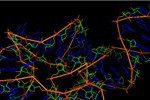 WIKIMEDIA, ETHEL AARDVARKThe spread of the invasive weed Parthenium hysterophorus could impact malaria-control efforts in Africa, researchers proposed in PLOS ONE last month (September 14), after finding that malaria-transmitting Anopheles gambiae mosquitoes frequently feed on the plant. “This is the first evidence of the interaction of invasive weeds and malaria,” study coauthor Baldwyn Torto of the International Centre for Insect Physiology and Ecology in Nairobi, Kenya, told The Scientist.
WIKIMEDIA, ETHEL AARDVARKThe spread of the invasive weed Parthenium hysterophorus could impact malaria-control efforts in Africa, researchers proposed in PLOS ONE last month (September 14), after finding that malaria-transmitting Anopheles gambiae mosquitoes frequently feed on the plant. “This is the first evidence of the interaction of invasive weeds and malaria,” study coauthor Baldwyn Torto of the International Centre for Insect Physiology and Ecology in Nairobi, Kenya, told The Scientist.
 UNIVERSITY OF CAMBRIDGEIn order to properly form memories, the expression of several genes in the mouse hippocampus is downregulated or repressed, scientists from the Institute for Basic Science in Seoul, Korea, and their colleagues found. Their results were published in Science this week (October 1).
UNIVERSITY OF CAMBRIDGEIn order to properly form memories, the expression of several genes in the mouse hippocampus is downregulated or repressed, scientists from the Institute for Basic Science in Seoul, Korea, and their colleagues found. Their results were published in Science this week (October 1).
“It provides a fresh concept,” said Mauro Costa-Mattioli of the Baylor College of Medicine in Houston, Texas, who was not involved in the study. “Essentially, not only do you need translation stimulation, but you also need translational repression.”
 WIKIMEDIA, FDARDELThrough a comprehensive screening process, a team led by investigators at Merck found what could be a potential new antibiotic in a compound that targets an RNA-regulating riboswitch. The group described this RNA-targeting molecule, called ribocil, this week (September 30) in Nature.
WIKIMEDIA, FDARDELThrough a comprehensive screening process, a team led by investigators at Merck found what could be a potential new antibiotic in a compound that targets an RNA-regulating riboswitch. The group described this RNA-targeting molecule, called ribocil, this week (September 30) in Nature.
“Ninety-nine-point-nine percent of drug targets are proteins,” said Thomas Hermann of the University of California, San Diego, who was not involved in the work, “but they were prepared for the 0.1 percent outcome, and I think that’s ...



















